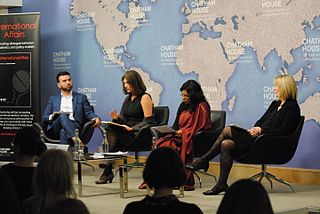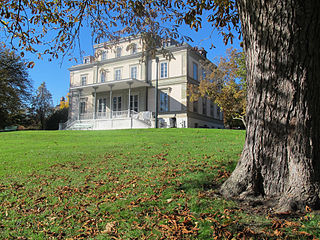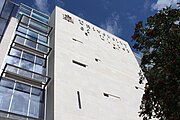
Ulster University, legally the University of Ulster, is a multi-campus public university located in Northern Ireland. It is often referred to informally and unofficially as Ulster, or by the abbreviation UU. It is the largest university in Northern Ireland and the second-largest university on the island of Ireland, after the federal National University of Ireland.

The Ulster University Magee campus is one of the four campuses of Ulster University. It is located in Derry, County Londonderry, Northern Ireland and opened in 1865 as a Presbyterian Christian arts and theological college. Since 1953, it has had no religious affiliation and provides a broad range of undergraduate and postgraduate academic degree programmes in disciplines ranging from business, law, social work, creative arts & technologies, cinematic arts, design, computer science and computer games to psychology and nursing.

Fionnuala Ní Aoláin is an Irish academic lawyer specialising in human rights law. She is the Special Rapporteur on the promotion and protection of human rights and fundamental freedoms while countering terrorism for the United Nations Human Rights Council since August 1, 2017.

Juan E. Méndez is an Argentine lawyer, former United Nations Special Rapporteur on Torture and Other Cruel, Inhuman or Degrading Treatment or Punishment, and human rights activist known for his work on behalf of political prisoners.

Monica Mary McWilliams is a Northern Irish academic, peace activist, human rights defender and former politician in Northern Ireland.
Marie Breen Smyth is an author, teacher and researcher from Northern Ireland. She has published on topics such as the Northern Ireland conflict, particularly the human impact, trauma, victim politics, children and armed conflict, research ethics and methods, religion and conflict, and issues to do with political violence in Southern Africa, Israel/Palestine and Northern Ireland.
Chandra Lekha Sriram (1971–2018) was Professor of Law at the University of London, School of Oriental and African Studies (SOAS). She has written and lectured widely on conflict prevention, post-conflict peacebuilding, human rights, international criminal law, and transitional justice. Her most recent monograph, Peace as governance: Power-sharing, armed groups, and contemporary peace negotiations (2008), offered a comparative critical examination of the use of power-sharing incentives in peace processes in Colombia, Sri Lanka, and Sudan. Previous monographs on transitional justice and international criminal accountability, Confronting past human rights violations: Justice versus peace in times of transition (2004) and Globalizing Justice for mass atrocities: A revolution in accountability (2005); examined transitional justice and internationalized and externalized criminal justice processes in or for Sierra Leone, Timor-Leste, El Salvador, Honduras, Sri Lanka, South Africa, and Argentina.
David Kretzmer is an Israeli expert in international and constitutional law. He is professor emeritus of international law of the Hebrew University in Jerusalem and professor of law at the Transitional Justice Institute at the University of Ulster in Northern Ireland. He has been a member of international and Israeli Human Rights organizations, including the UN Human Rights Committee under the International Covenant on Civil and Political Rights, serving as its vice-chairperson in 2001 and 2002. He established the Centre for Human Rights at the Hebrew University of Jerusalem and was a founding member of the Association for Civil Rights in Israel, the Minerva Centre for Human Rights, a joint centre of the Hebrew University and Tel Aviv University. He is also a founding member of B'Tselem. Kretzmer is a member of the Israeli Law Professors' Forum for Democracy, established in 2023 to respond to the Israeli coalition's plans for changes in the legal system.

Penelope (Penny) Andrews is a South African and American legal scholar.

The Geneva Academy of International Humanitarian Law and Human Rights is a postgraduate joint center located in Geneva, Switzerland. The faculty includes professors from both founding institutions and guest professors from major universities.
The Ulster University School of Law is a School of Ulster University which is physically located at the Belfast and Magee campuses. The School was also located at the Jordanstown campus prior to moving to the new Belfast City Centre campus in August 2022.
The Belfast Guidelines is a project led by Professor Louise Mallinder and Prof Tom Hadden of the Transitional Justice Institute. The Guidelines examine the principles concerning the legality and legitimacy of amnesties in states transitioning from conflict or authoritarian regimes. They were drafted by an expert group that included Prof David Kretzmer and Prof William Schabas. They have been widely translated into Arabic, Chinese, Malay, Portuguese, Russian, Spanish and Thai.
Aisling Swaine is an associate professor of practice of international affairs, focusing on women, security and development at the Elliott School of International Affairs of the George Washington University.

Rashida Manjoo is an Emeritus Professor at the University of Cape Town in Cape Town and a social activist involved in the eradication of violence against women and gender-based violence. Manjoo was the United Nations' Special Rapporteur on Violence Against Women from June 2009 to July 2015.

Fiona de Londras is an Irish academic and the Professor of Global Legal Studies at the University of Birmingham, UK. From 2019 to 2022, she was also an honorary professor at the Australian National University in Canberra.

Ruth Halperin-Kaddari is an Israeli legal scholar and international women's rights advocate who is known for her work on family law, feminist legal theory, women's rights in international law, and women and religion. She was a member of the United Nations Committee on the Elimination of Discrimination against Women from 2006 to 2018, and was the committee's vice chair during several terms. She is Professor of Law at the Bar-Ilan University and is the founding Academic Director of the Ruth and Emanuel Rackman Center for the Advancement of the Status of Women. She is also involved in international academic collaborations on the theme of women, state, and religion, and participates in international litigations as an expert on Israeli family law.
Christine Bell, FBA, FRSE, is a legal scholar, specialising in human rights law. As of 2018, she is Professor of Constitutional Law and Assistant Principal at the University of Edinburgh.
Rosa Anne Freedman, who has written as Rosa Davis, is a British professor of law, conflict, and global development at the University of Reading. Her principal area of research is the activities of the United Nations as they relate to human rights. She has given evidence before the Foreign Affairs Select Committee of the House of Commons of the United Kingdom about the human rights work of the Foreign and Commonwealth Office, and to the Scottish Government relating to gender questions on the national census.











